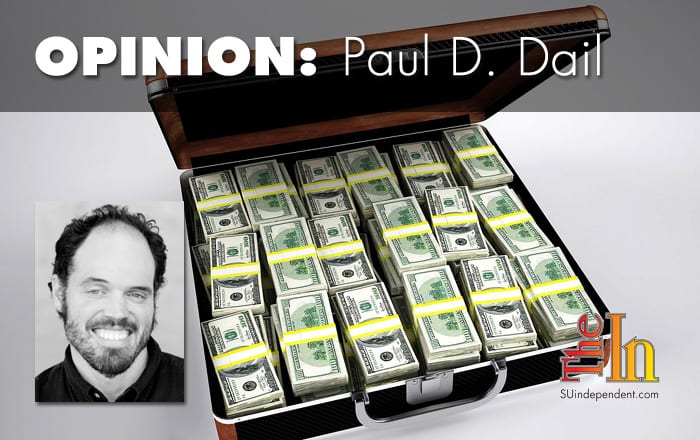
Written by Paul Dail
Devil’s advocate: A person who, given a certain issue, takes a position he/she does not necessarily agree with—or simply an alternative position from the accepted norm—for the sake of debate or to explore the thought further.
Recently, CBS aired a new reality television show called “The Briefcase.” The premise is simple: a poverty-stricken family is presented with $101,000 and then given the choice to keep it or give some (or even all of it) to another needy family. “The Briefcase” is raising ire everywhere. Well, almost everywhere. Apparently, it was the most watched show on the Wednesday night of its premier, garnering almost 7 million viewers.
The Detroit Free Press labeled the show “tragedy, not entertainment.” However, the devil’s advocate in me says that the tragedy is not that these CBS executives dangle all that money in front of poor people and then make them decide what they are going to do with it. Well, it’s still pretty messed up, but the fact is, ultimately somebody in need is going to get handed a whole lot of money. And at the center of it all is a fascinating social experiment. At least to me. The problem comes about when they put it on television and call it reality.
The good intentions
This is kind of an easy one to figure out, so I don’t think I need to spend much time here. Somewhere in the ranks at CBS, I’d be willing to bet that at least one person thinks they’re doing something good when it comes to “The Briefcase,” and while not all of those 7 million viewers may have liked it, you can bet some watched the final credits a little teary eyed. Because again, the reality (no pun intended) is that $101,000 is an amazing windfall.
But there’s an old saying about the paving of the road to Hell, right?
“The Briefcase” paints “good” and “evil” in ambiguity
I could go into the whole psychology of “The Briefcase”—discussions of things like altruism and how we often view our personal situations as “all relative” compared with others, especially when it comes to struggles—but instead I’ll just give you my shameless confession. If I was on the brink of poverty and witnessing my children going hungry, I would take at least some of the money. Can you really blame me for that?
But that’s the problem. If you put me on television, suddenly I’m going to assume that people will judge me and call me “greedy,” especially if I chose to keep all the money. And not just a few friends and family who might find out about the decision I made if it happened in my regular, non-televised life. Put me on television, and now I have 7 million people judging my decisions.
The reality of the situation is that it’s not reality at all. It’s an old argument, but I’ll make it again. When you put the camera on humanity, we all become actors. We decide what role we are going to play based on how we want to be viewed by others. Unlike real life where we are typically only held accountable to ourselves, and the aforementioned friends and family when it comes to moral decisions, under the camera’s lens, every choice we make is painted by considerations of how the entire world will view us.
So suddenly what was an interesting concept at its roots—a fascinating social experiment to see how people would respond to this quandary that does raise some of those discussion topics I mentioned earlier—gets thrown out the window.
Given this choice in real life, I would daresay that most people who were struggling would make the same decision I would make to keep at least some of the money…providing the camera wasn’t on them. What makes it a much harder decision for these people isn’t necessarily a choice between doing the “right” or “wrong” thing; it’s being perceived by others as doing the “right” or “wrong” thing.
Apparently, even given the criticism, CBS has no plans of pulling the show. So let the judgments begin. But can we force altruism on others simply because they know they will be judged by millions? Is it really a good deed if one acts out of fear of public shaming? And is it really shameful to want your family to be taken care of?
“The Briefcase” is really just slumming for ratings. It’s a pretty screwed up concept, and there have to be better ways to address the issue of poverty in our county. But this is a television network we’re talking about, not a philanthropic organization. And again, in the end, someone walks away thousands of dollars richer.
If you don’t like it, don’t watch it.
In the parlance of the youth of today, I’m just sayin’.
Paul D. Dail received his BFA in English with a Creative Writing emphasis from the University of Montana, Missoula. In addition to news and his bi-weekly opinion column, he also enjoys writing creative nonfiction and fiction (with a penchant for the darker side of the page). His collection of flash fiction, “Free Five,” has spent over a year and a half in the top 50 Kindle Horror Short Stories since its publication in 2012.
Currently Paul lives on the outskirts of Kanarraville, surrounded by the sagebrush and pinyon junipers, with his wife and two children. Read more about him at www.pauldail.com. While he prefers that any comments directed at a specific article be posted in a public forum, he welcomes all other correspondence at [email protected].




